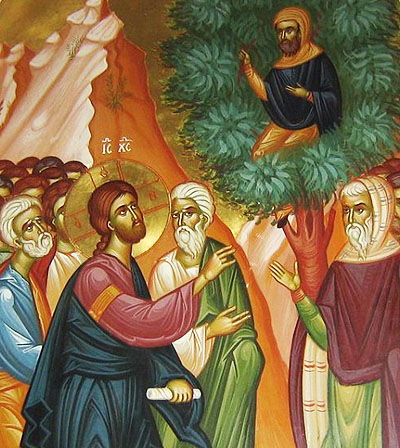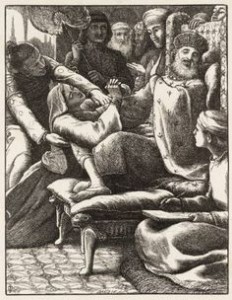Homily of Deacon Gregory Maskarinec – 33rd Sunday of Ordinary Time
Luke 19:5-19
 In today’s Gospel, Jesus spoke about the coming destruction of the temple which was the center of the world for the first century Jews. He also spoke about the coming of ward, uprisings, earthquakes, famines, and plaques. Being seized and persecuted, handed over by family, relatives, and friends. Being hated, imprisoned, and put to death…all because of Him, the Lord. At the end of the Gospel I proclaimed, “The Gospel of the Lord.” As you probably know, the word “Gospel” means “good news.” In ancient times the “good news” was generally a message proclaimed by the King to his people, usually in connection with a military victory, promising the citizens good times and prosperity. What we just heard was a proclamation of the “good news of the Lord.” You must have agreed because you responded, “Praise to You, Lord Jesus Christ.” In other words, praise to You, Lord for that good news! If that’s the good news, we might be afraid to hear the bad!
In today’s Gospel, Jesus spoke about the coming destruction of the temple which was the center of the world for the first century Jews. He also spoke about the coming of ward, uprisings, earthquakes, famines, and plaques. Being seized and persecuted, handed over by family, relatives, and friends. Being hated, imprisoned, and put to death…all because of Him, the Lord. At the end of the Gospel I proclaimed, “The Gospel of the Lord.” As you probably know, the word “Gospel” means “good news.” In ancient times the “good news” was generally a message proclaimed by the King to his people, usually in connection with a military victory, promising the citizens good times and prosperity. What we just heard was a proclamation of the “good news of the Lord.” You must have agreed because you responded, “Praise to You, Lord Jesus Christ.” In other words, praise to You, Lord for that good news! If that’s the good news, we might be afraid to hear the bad!
You may be wondering, just what is the good news in today’s readings? As we approach the end of the liturgical year the readings focus on the End Times. Both the prophet Malichi and the Psalmist assert that when the time comes the Lord will rule the world with justice. Justice is the state of living in a right relationship with God and others. The harmony of original justice whereby man lived in peace with God in the garden was lost through sin of our first parents, Adam and Eve. The good news is that at the end of time the Lord will come and re-establish the harmony that existed in the beginning between God and humanity.
And while the Gospel might sound bleak there are rays of light that serve as sources of hope. First, during difficult times the Lord promises to strengthen us and to be a source of wisdom. We must trust in the Lord, which as you will know, can be difficult. I have to admit that as I prepare a homily and am stricken with writer’s block, which is nearly every time I preach, trusting that the Lord will give me the right words can be very challenging. Continue reading “Sacramental Grace…the Key to Perserverance”






